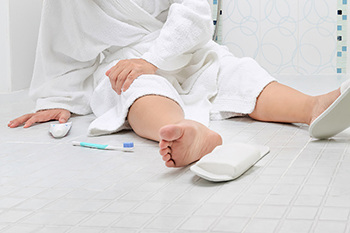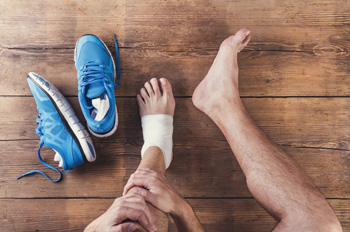Connect With Us
Blog
Items filtered by date: February 2022
Risk Factors for Falling
 Falling is one the leading causes of injury and disability among older adults. This is due to the declining vision, reduced sensitivity in the nerves of the feet, reduced sense of depth, and decreased dark adaptation associated with aging. Other risk factors for falling include having a chronic medical condition, such as arthritis, diabetes, or Parkinson’s disease; having muscle weakness in the lower limbs or a foot disorder; or having balancing difficulties and dizziness. Lifestyle factors, including taking certain medications and not exercising, can contribute to falling as well. Environmental factors, such as wearing ill-fitting shoes, having tripping and falling hazards in the home, and not using walking aids properly, can also raise the risk of falling. If you would like to learn more about preventing falls, please consult with a podiatrist.
Falling is one the leading causes of injury and disability among older adults. This is due to the declining vision, reduced sensitivity in the nerves of the feet, reduced sense of depth, and decreased dark adaptation associated with aging. Other risk factors for falling include having a chronic medical condition, such as arthritis, diabetes, or Parkinson’s disease; having muscle weakness in the lower limbs or a foot disorder; or having balancing difficulties and dizziness. Lifestyle factors, including taking certain medications and not exercising, can contribute to falling as well. Environmental factors, such as wearing ill-fitting shoes, having tripping and falling hazards in the home, and not using walking aids properly, can also raise the risk of falling. If you would like to learn more about preventing falls, please consult with a podiatrist.
Preventing falls among the elderly is very important. If you are older and have fallen or fear that you are prone to falling, consult with David A. Edmonds, DPM from Advanced Podiatry Associates. Our doctor will assess your condition and provide you with quality advice and care.
Every 11 seconds, an elderly American is being treated in an emergency room for a fall related injury. Falls are the leading cause of head and hip injuries for those 65 and older. Due to decreases in strength, balance, senses, and lack of awareness, elderly persons are very susceptible to falling. Thankfully, there are a number of things older persons can do to prevent falls.
How to Prevent Falls
Some effective methods that older persons can do to prevent falls include:
- Enrolling in strength and balance exercise program to increase balance and strength
- Periodically having your sight and hearing checked
- Discuss any medications you have with a doctor to see if it increases the risk of falling
- Clearing the house of falling hazards and installing devices like grab bars and railings
- Utilizing a walker or cane
- Wearing shoes that provide good support and cushioning
- Talking to family members about falling and increasing awareness
Falling can be a traumatic and embarrassing experience for elderly persons; this can make them less willing to leave the house, and less willing to talk to someone about their fears of falling. Doing such things, however, will increase the likelihood of tripping or losing one’s balance. Knowing the causes of falling and how to prevent them is the best way to mitigate the risk of serious injury.
If you have any questions, please feel free to contact our offices located in Northampton and Allentown, PA . We offer the newest diagnostic and treatment technologies for all your foot care needs.
Ankle Sprains and Chronic Ankle Instability
 If you have ever had an ankle sprain, it is likely an experience that you wouldn’t want to repeat. Yet spraining your ankle once can make future ankle sprains more likely. In some individuals, the sprained ankle doesn’t heal fully. This not only increases the risk for future sprains, but can also cause chronic ankle instability. Chronic ankle instability is characterized by ankle pain, swelling, tenderness, stiffness, and repeated sensations of the ankle “giving out.” The ankle instability can be caused by excessively lax ligaments, or deficits in the nerves and muscles surrounding the ankles. If you are prone to ankle sprains, don’t live with chronic pain. Please seek the care of a podiatrist for a proper diagnosis and treatment.
If you have ever had an ankle sprain, it is likely an experience that you wouldn’t want to repeat. Yet spraining your ankle once can make future ankle sprains more likely. In some individuals, the sprained ankle doesn’t heal fully. This not only increases the risk for future sprains, but can also cause chronic ankle instability. Chronic ankle instability is characterized by ankle pain, swelling, tenderness, stiffness, and repeated sensations of the ankle “giving out.” The ankle instability can be caused by excessively lax ligaments, or deficits in the nerves and muscles surrounding the ankles. If you are prone to ankle sprains, don’t live with chronic pain. Please seek the care of a podiatrist for a proper diagnosis and treatment.
Ankle sprains are common but need immediate attention. If you need your feet checked, contact David A. Edmonds, DPM from Advanced Podiatry Associates. Our doctor can provide the care you need to keep you pain-free and on your feet.
How Does an Ankle Sprain Occur?
Ankle sprains take place when the ligaments in your ankle are torn or stretched beyond their limits. There are multiple ways that the ankle can become injured, including twisting or rolling over onto your ankle, putting undue stress on it, or causing trauma to the ankle itself.
What Are the Symptoms?
- Mild to moderate bruising
- Limited mobility
- Swelling
- Discoloration of the skin (depending on severity)
Preventing a Sprain
- Wearing appropriate shoes for the occasion
- Stretching before exercises and sports
- Knowing your limits
Treatment of a Sprain
Treatment of a sprain depends on the severity. Many times, people are told to rest and remain off their feet completely, while others are given an air cast. If the sprain is very severe, surgery may be required.
If you have suffered an ankle sprain previously, you may want to consider additional support such as a brace and regular exercises to strengthen the ankle.
If you have any questions please feel free to contact our offices located in Northampton and Allentown, PA . We offer the newest diagnostic and treatment technologies for all your foot and ankle needs.
Are You Suffering From Ingrown Toenails?
Healing Cracked Heels
Cracked heels develop when the skin on the heels become dry and callused, and pressure from standing and walking create splits in the skin. Cracked heels can be caused by wearing shoes that expose the heels to the elements, aging skin, genetics, certain skin conditions or vitamin deficiencies, a lack of moisture in the skin, pressure from standing for prolonged periods of time, obesity, and more. Keeping your feet clean and moisturized, while improving the quality of skin through proper nutrition can help prevent cracked heels from occurring. If you have developed cracked heels that are not getting better or are deepening or bleeding, contact a podiatrist for treatment.
If the skin on your feet starts to crack, you may want to see a podiatrist to find treatment. If you have any concerns, contact David A. Edmonds, DPM from Advanced Podiatry Associates. Our doctor can provide the care you need to keep you pain-free and on your feet.
Cracked Heels
It is important to moisturize your cracked heels in order to prevent pain, bleeding, and infection. The reason cracked heels form is because the skin on the foot is too dry to support the immense pressure placed on them. When the foot expands, the dry skin on the foot begins to split.
Ways to Help Heal Them
- Invest in a good foot cream
- Try Using Petroleum Jelly
- Ease up on Soaps
- Drink Plenty of Water
Ways to Prevent Cracked Heels
- Moisturize After Showering
- Skip a Shower
- Keep Shower Water Lukewarm
- Don’t Scrub Your Feet
If you are unsure how to proceed in treating cracked heels, seek guidance from a podiatrist. Your doctor will help you with any questions or information you may need.
If you have any questions, please feel free to contact our offices located in Northampton and Allentown, PA . We offer the newest diagnostic and treatment technologies for all your foot care needs.
What Does Diet Have to Do With Gout?
If you have ever suffered from a gout attack, a sudden and extremely painful inflammation of one or more joints in your foot, you may be surprised to find that one of the ways to manage symptoms and prevent future attacks is to modify your diet. Gout is caused by a buildup of a substance called uric acid in the bloodstream. This substance can crystallize and become lodged in a joint, leading to intense pain, swelling, and inflammation. Left untreated, repeated gout attacks can permanently damage the affected joints, causing chronic pain and restricting their range of motion. Purines are chemical compounds naturally found in certain foods. In the body, purines get converted to uric acid. When there are too many purines, they can create excess uric acid that builds up in the body, increasing your risk of having a gout attack. By avoiding foods and drinks with large amounts of purine, you may be able to lower your risk of gout. Foods to avoid include red and organ meats, certain types of seafood, highly processed or sugary foods, and yeast. You should also avoid drinking sugary or alcoholic beverages. For more information about the relationship between your diet and your foot health, please consult with a podiatrist.
Gout is a painful condition that can be treated. If you are seeking treatment, contact David A. Edmonds, DPM from Advanced Podiatry Associates. Our doctor will treat your foot and ankle needs.
What Is Gout?
Gout is a form of arthritis that is characterized by sudden, severe attacks of pain, redness, and tenderness in the joints. The condition usually affects the joint at the base of the big toe. A gout attack can occur at any random time, such as the middle of the night while you are asleep.
Symptoms
- Intense Joint Pain - Usually around the large joint of your big toe, and it most severe within the first four to twelve hours
- Lingering Discomfort - Joint discomfort may last from a few days to a few weeks
- Inflammation and Redness -Affected joints may become swollen, tender, warm and red
- Limited Range of Motion - May experience a decrease in joint mobility
Risk Factors
- Genetics - If family members have gout, you’re more likely to have it
- Medications - Diuretic medications can raise uric acid levels
- Gender/Age - Gout is more common in men until the age of 60. It is believed that estrogen protects women until that point
- Diet - Eating red meat and shellfish increases your risk
- Alcohol - Having more than two alcoholic drinks per day increases your risk
- Obesity - Obese people are at a higher risk for gout
Prior to visiting your podiatrist to receive treatment for gout, there are a few things you should do beforehand. If you have gout you should write down your symptoms--including when they started and how often you experience them, important medical information you may have, and any questions you may have. Writing down these three things will help your podiatrist in assessing your specific situation so that he or she may provide the best route of treatment for you.
If you have any questions, please feel free to contact our offices located in Northampton and Allentown, PA . We offer the newest diagnostic and treatment technologies for all your foot care needs.



